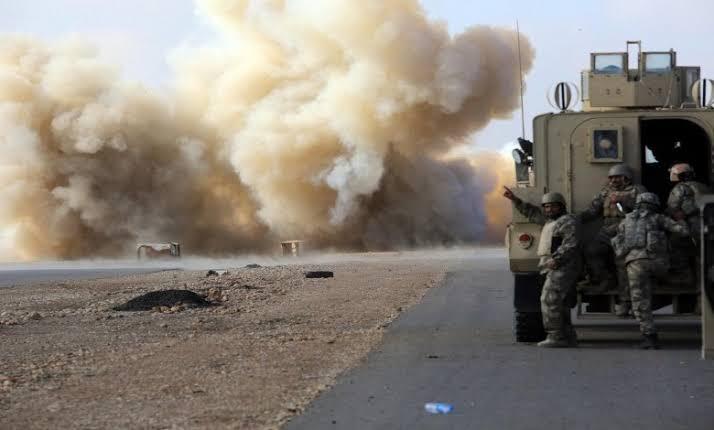The rate of attacks on American presence in Iraq has seriously escalated lately, the latest being an attack on the Ain El Assad base in Al Anbar province, with 14 rockets that led to 3 injuries on the 7th of July. Another incident, one day earlier, targeted Erbil Airport that also hosts US forces in the Kurdistan region, with an Unmanned Aerial Vehicle (UAV). Although not conclusively proven, the Hashd al-Shaabi militias are the most likely perpetrators of these attacks. This remains a major obstacle to domestic efforts at reconciliation and to the management of Iraq’s international alliance.
Tehran’s Tacit Approval
There is a general consensus in the US and Iraq that Iran has given the green light to these attacks, this has been reflected in the following stances:
1- American persistence in holding Iran responsible: The US administration continues to put the blame squarely on Iran. Spokesperson for the US Department of Defense, John Kirby noted on the 13th of July that “Iran and its militias are responsible for the recent attacks on US military bases in Iraq and Syria”. Iran has always denied these involvements, and perceives these accusations as “fabrications”, and an inaccurate reading of Article 51 of the UN Charter, whereby a nation under attack needs to inform the Security Council of the situation.
2- Baghdad’s Warning Regarding Iran’s Sponsoring of Militia Attacks: According to several reports, Iraqi Prime Minister Moustafa al-Kazimi sent a clear message on these attacks to Iran , during a visit by the head of the Iranian Revolutionary Guard Intelligence Hussein Taib to Baghdad lately. He was informed that the targeting by pro Iran militias of foreign consulates and the International Alliance forces in Iraq could influence the current US – Iranian negotiations and affect the timeline for the withdrawal of US forces from Iraq. He asked Iran to intervene directly to put an end to these attacks.
The Rational Behind These Repeated Attacks
The continuing attacks against American interests in Iraq are due to several reasons:
1- Fallout from the Win of the Iranian President: It is noteworthy that attacks increased after Ebrahim Raisi won the Iranian elections on the 18th of June, which indicates that the militias loyal to Iran in the region have grown bolder with the arrival of a right-wing government in Iran. The militias appear to believe that any US escalation against Iran or its regional proxies will be retaliated against in Iraq, which remains Iran’s main base of influence in the region.
In this respect, the US Defense Department had announced on the 28th of June that US forces conducted a strike on facilities under the control of Iranian supported militias on the Syrian-Iraqi border. The Defense department noted that the US strikes specifically targeted 2 arms depots, one in Syria and one in Iraq. These facilities were in use by several Iranian backed militias, including the Iraqi Hezbollah, and Kataeb Sayed El Shohadaa.
2- Hastening the Withdrawal of American Forces from Iraq: Iran is seeking to increase the pressure on US forces to withdraw from the region at a faster pace. Iran perceives the withdrawal from Afghanistan presents an unprecedented opportunity to force the Americans to also withdraw from Iraq.
3- Undermining al-Kazimi: The current Iraqi Prime Minister Moustafa al-Kazimi has adopted a policy that does not completely align with Iran’s interests, as opposed to most of his predecessors. And since the current priority for al-Kazimi is to stabilize the security situation, It appears Iran and its’s militias are taking every opportunity to place obstacles in the way of achieving that goal both on the political and security levels. This is a clear attempt to prevent the reelection of al-Kazimi in the coming legislative elections on the 10th of October.
Despite al-Kazimi’s efforts to restore the role of the state as the guarantor of security and stability in Iraq, he is still confronted with many obstacles, including the role of pro Iran Militias.
4- An Attempt to Delay Early Elections in Iraq: The attacks appear to be an attempt to delay the elections set for the 10th of October, back to their original time of April 2022. This would allow the current parliament to carry out its full term, as is the wish of several Iraqi political forces, including “Ahl El Haq” and “Eetelaf Dawalt El Qanoon”. Showing that the current government is unable to maintain security would reinforce this argument.
In conclusion, the current situation suggests that there will be a further escalation of attacks against American targets in Iraq in the near future, in light of the increased tensions between al-Kazimi and certain political forces and armed militias. The ongoing uncertainty regarding the negotiations in Vienna , which has been postponed pending the formation of a new Iranian government under the leadership of the new President Ebrahim Raisi, makes such escalation likely.

